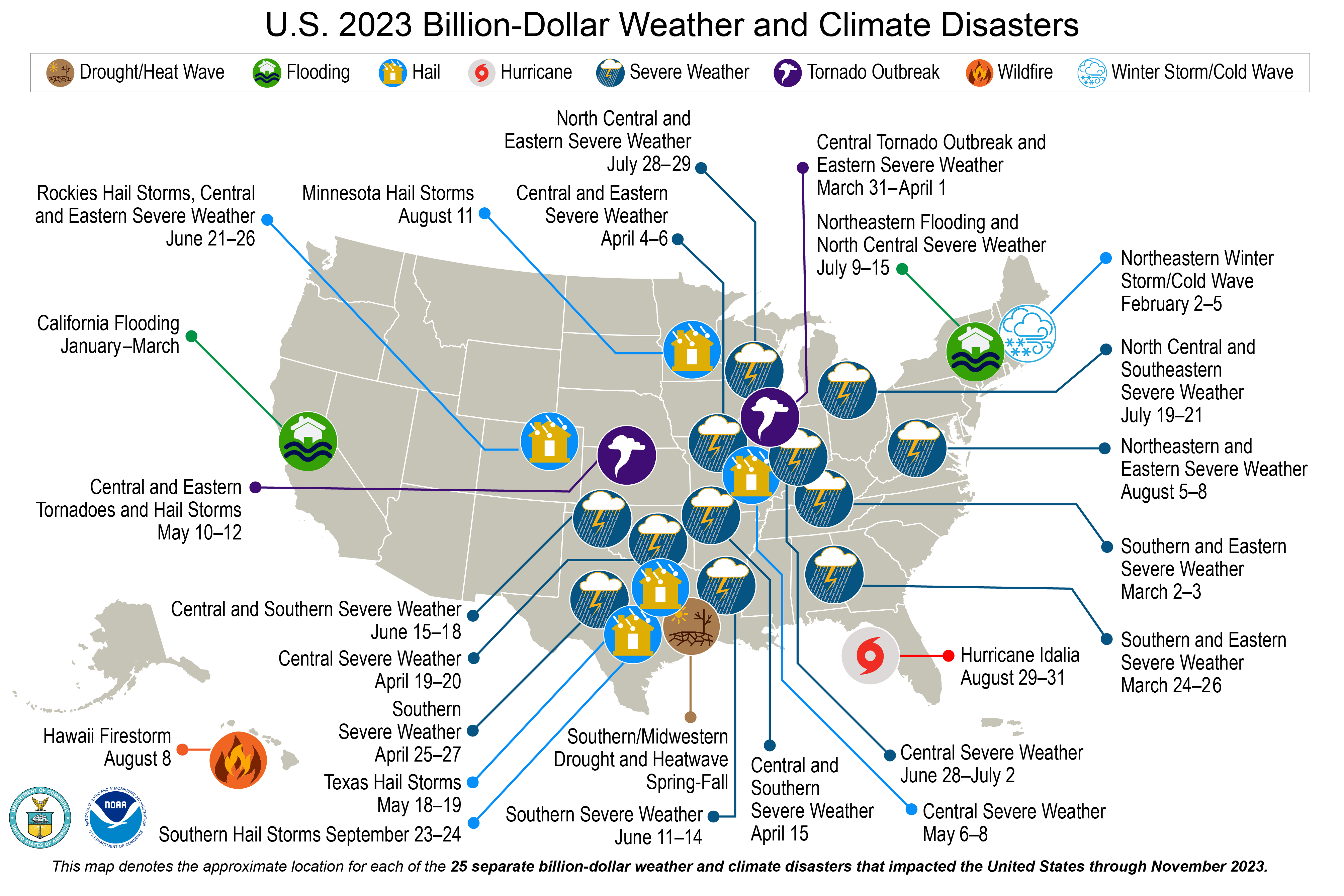Assessing the U.S. Climate in November 2023
[ad_1]
Key Points:
- Record- warm sea surface temperatures in the Atlantic basin brought 20 named tropical systems during 2023, ranking fourth for the most named storms in a year since 1950. Three of these storms made landfall—Hurricane Idalia and tropical storms Harold and Ophelia.
- The first significant lake-effect snowstorm of the season occurred on November 27–29, bringing snow accumulations of greater than 40 inches to portions of New York state.
- Year-to-date temperatures across the eastern U.S. have been warmer than average in 2023 with 31 states experiencing a top-10 warmest January–November.
- Although no new events were identified in November, a total of 25 separate billion-dollar weather and climate disasters have been confirmed this year—the most events on record during a calendar year. The total cost of these events exceeds $81.0 billion.
- November 2023 was the 19th-warmest November on record for the nation, and precipitation ranked 12th driest in the historical record for the month.
Other Highlights
Temperature
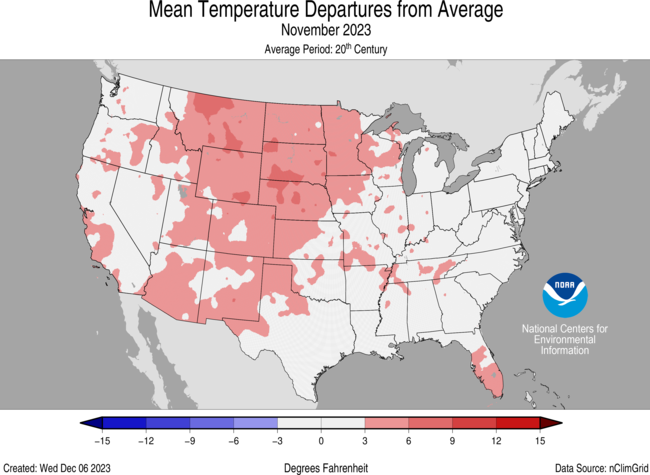
The average temperature of the contiguous U.S. in November was 44.4°F, 2.7°F above average, ranking 19th warmest in the 129-year record. Generally, November temperatures were above average across much of the contiguous U.S., while below-normal temperatures were observed in parts of the Northeast. No state ranked among their top-10 warmest or coldest November on record.
The Alaska statewide November temperature was 20.3°F, 8.6°F above the long-term average, ranking fourth warmest in the 99-year period of record for the state. Above-normal temperatures were observed across the entire state during the month.

The meteorological autumn (September–November) average temperature for the contiguous U.S. was 56.1°F, 2.5°F above average, ranking sixth warmest on record. Temperatures were above average across most of the contiguous U.S., with record-warm temperatures observed in parts of New Mexico, western Texas and northern Maine. New Mexico and Texas each ranked third warmest on record, while Maine ranked fourth warmest for this autumn season. An additional 10 states ranked among their top-10 warmest on record for this period.
The Alaska autumn temperature was 29.6°F, 3.7°F above the long-term average, ranking 13th warmest on the record for the state. Temperatures were above average across most of the state of Alaska while some parts of south-central Alaska saw near-average autumn temperatures.
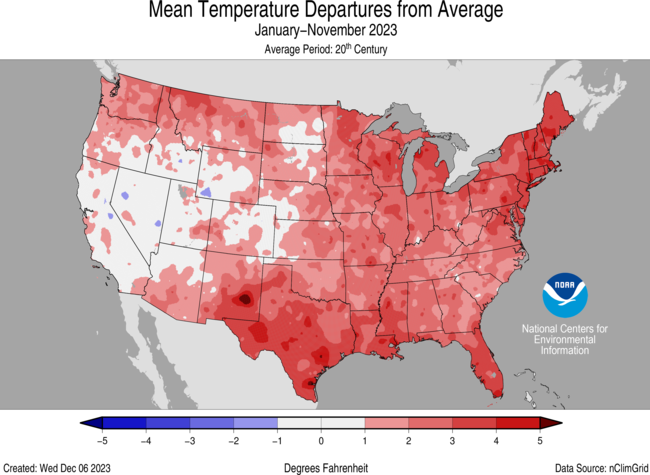
For January–November, the average contiguous U.S. temperature was 55.8°F, 2.0°F above average, ranking 10th warmest on record for this period. Temperatures were above average from parts of the Southwest to the East Coast and along much of the Northern Tier, with near- to below-average temperatures from the central Rockies to California and in parts of the northern and central Plains. Texas, Louisiana and Mississippi each ranked warmest on record while Massachusetts, Connecticut and Florida each ranked second warmest for the January–November period. An additional 25 states had a top-10 warmest year-to-date period. No state experienced a top-10 coldest January–November.
The Alaska January–November temperature was 30.5°F, 2.5°F above the long-term average, ranking 18th warmest in the historical record for the state. Much of the state was above normal for the 11-month period while temperatures were near average across small parts of western and interior parts of the state.
Precipitation
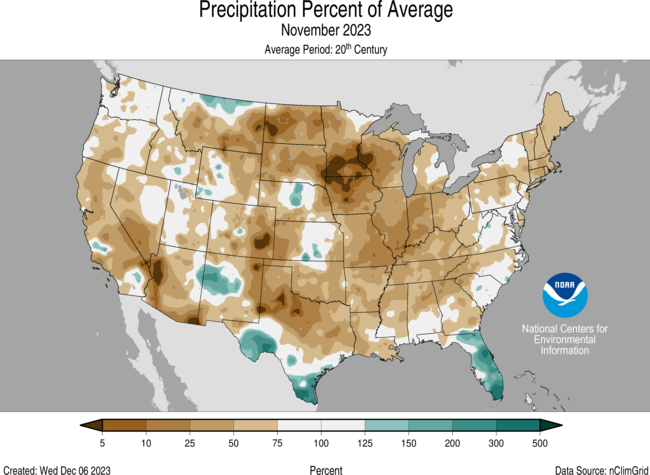
November precipitation for the contiguous U.S. was 1.38 inches, 0.85 inch below average, ranking 12th driest in the historical record. Precipitation was near to below average across most of the contiguous U.S., while above-normal precipitation was observed in parts of southern California, the Rockies, central and southern Plains and Southeast. No state ranked in their top-10 wettest November on record for this period. On the dry side, Indiana ranked third driest on record for the month, while four additional states in the Midwest ranked among their top-10 driest November on record.
Across the state of Alaska, the average monthly precipitation was 4.62 inches, ranking as the 16th- wettest November in the historical record. Precipitation was above average in parts of the North Slope, Interior and along parts of the Gulf of Alaska, while precipitation was near normal across much of the West Coast and in parts of the Southwest, northeast Interior and Panhandle. Below-normal precipitation was observed in the parts of the Aleutians during the month.
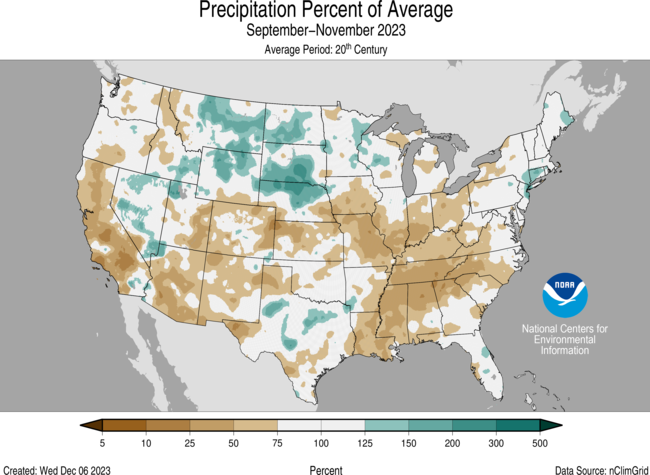
The U.S. autumn precipitation total was 5.66 inches, 1.22 inch below average, ranking 15th driest in the September–November record. Precipitation was below average across much of the eastern half of the U.S., the Southwest, California and in parts of the Northwest and central Plains. Autumn precipitation was above average from the northern Rockies to the western Great Lakes and in parts of the Great Basin, southern Plains, Northeast and Southeast. Tennessee ranked third driest with three additional states in the Mississippi and Ohio Valleys ranking among their top-10 driest autumn season on record. No state ranked in their top-10 wettest on record for the September–November period.
For autumn season precipitation, Alaska ranked in the wettest third of the record with wetter-than-average conditions observed across much of the state. Near-normal precipitation was observed in parts of the Interior and south Central Alaska, while below-normal precipitation occurred in parts of the Southwest and Aleutians during this season.

The January–November precipitation total for the contiguous U.S. was 26.89 inches, 0.70 inch below average, ranking in the driest third of the 129-year record. Precipitation was near to above average across much of the Northeast, from the northern Plains to the West Coast, as well as in parts of the central and southern Plains, northern Great Lakes, Lower Mississippi Valley and Southeast. Wyoming ranked seventh wettest on record, while four additional states ranked among their top-10 wettest for this year-to-date period. Conversely, precipitation was below average from parts of the Southwest to the Gulf of Mexico and in parts of the Northwest, upper and central Mississippi Valley and Mid-Atlantic during the January–November period. Louisiana and Maryland ranked seventh and eighth driest on record, respectively, for this 11-month period.
The January–November precipitation ranked ninth wettest in the 99-year record for Alaska, with above-average precipitation observed across most of the state. Near-normal precipitation was observed in parts of the Southwest, while parts of the Aleutians experienced below-average precipitation during this period.
Other Notable Events
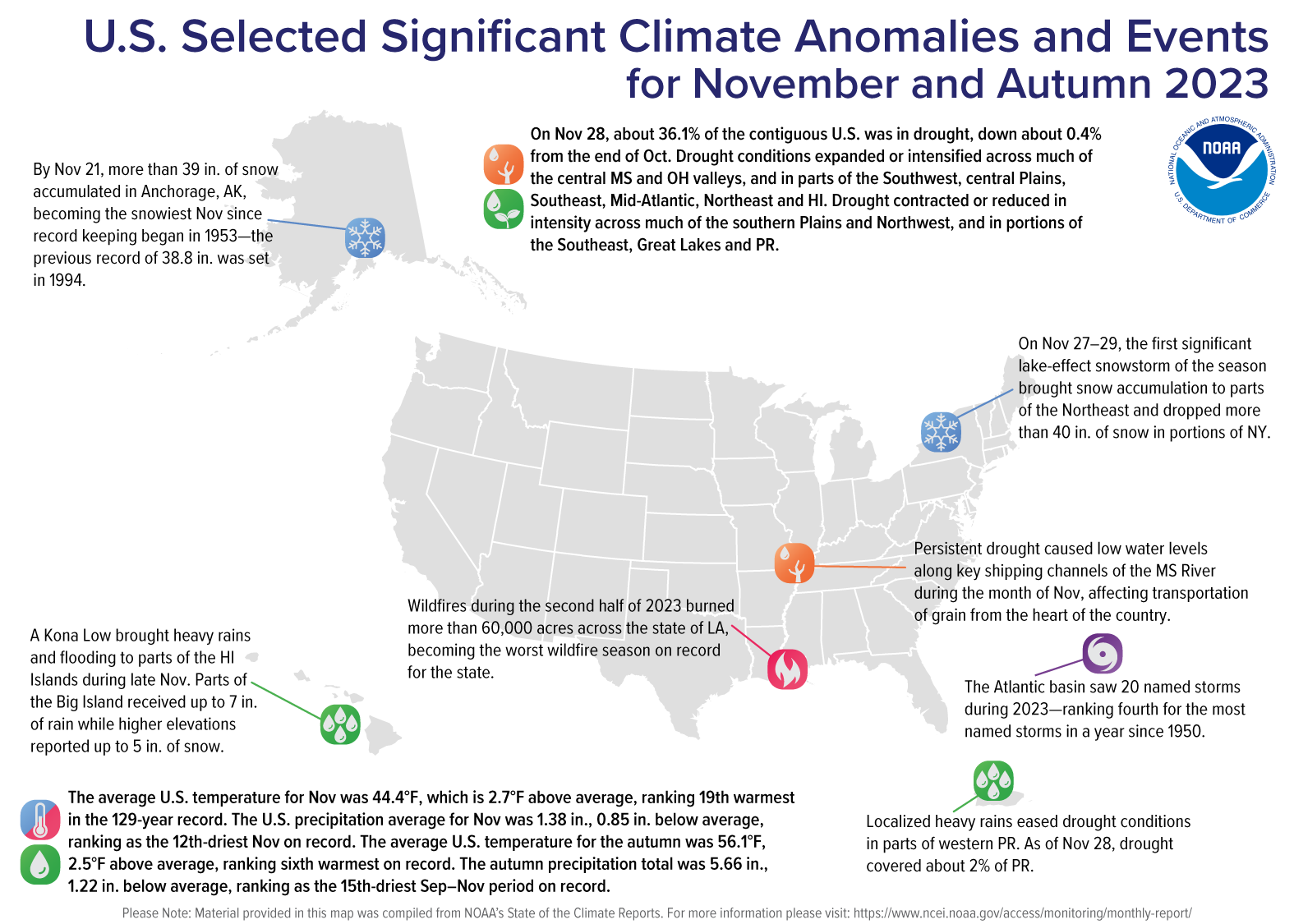
Persistent heat brought above-normal temperatures to much of the U.S. during 2023. Approximately 32 million people were impacted by record heat during the January–November period.
By November 21, more than 39 inches of snow accumulated in Anchorage, Alaska, with this November becoming the snowiest November since record-keeping began in 1953—the previous record was 38.8 inches set in 1994.
Much of the country observed temperatures 10–20°F below average during the late part of November. On the morning of November 29, record-low temperatures occurred over parts of the eastern U.S.
A Kona Low brought heavy rains and flooding to parts of the Hawaiian Islands during late November. Parts of the Big Island received up to 7 inches of rain while higher elevations reported up to 5 inches of snow.
Drought
According to the November 28 U.S. Drought Monitor report, about 36.1% of the contiguous U.S. was in drought, down about 0.4% from the end of October. Moderate to exceptional drought was widespread across much of the Lower Mississippi Valley to the Tennessee Valley, central Great Plains and Southwest, with moderate to extreme drought across parts of the southern Great Plains, Hawaii and in parts of the Florida Peninsula. Moderate to severe drought was present in parts of the Northwest, Mid-Atlantic and New York, as well as moderate drought in parts of the Great Lakes and Puerto Rico.
Drought conditions expanded or intensified across much of the central Mississippi and Ohio valleys, and in parts of the Southwest, central plains, Southeast, Mid-Atlantic, Northeast and Hawaii this month. Drought contracted or was reduced in intensity across much of the Northwest and southern Plains, and in portions of the Southeast, Great Lakes and Puerto Rico.
Monthly Outlook
According to the November 30 One-Month Outlook from the Climate Prediction Center, above-normal monthly average temperatures are favored for much of the contiguous U.S. and parts of northern Alaska in December, with the greatest odds across parts of the Mississippi River Valley. Below-normal temperatures are most likely for parts of Southwest Alaska this month. Much of the Pacific Northwest and parts of the central and southern Plains to the East Coast, as well as eastern Alaska are favored to see above-normal monthly total precipitation while below-normal precipitation is most likely to occur for parts of North Dakota to northern Michigan. Drought improvement or removal is forecast along parts of the Pacific Northwest coast, for parts of the central and southern Plains, Hawaii, and in parts of the Southeast and Mid-Atlantic. Persistence is more likely across much of the Northern Tier, Southwest and upper Midwest.
According to the One-Month Outlook issued on December 1 from the National Interagency Fire Center, the islands of Hawaii have above-normal significant wildland fire potential during the month of December.
This monthly summary from NOAA’s National Centers for Environmental Information is part of the suite of climate services NOAA provides to government, business, academia and the public to support informed decision-making. For more detailed climate information, check out our comprehensive November 2023 U.S. Climate Report scheduled for release on December 13, 2023. For additional information on the statistics provided here, visit the Climate at a Glance and National Maps webpages.
[ad_2]


